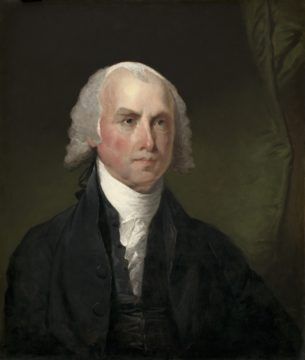by Mark Harvey

The trouble with theocracies is that they generally lead to crusades. And the trouble with crusades is that if you’re not of the right sect or denomination, you’ll end up crucified. Theocracies lead nowhere, bring great suffering on peoples, stifle creative thought, and have women covered or in the kitchen. They do anything but lead to paradise on earth. But they do give people a taste of hell.
Whether it’s the Taliban in Afghanistan, the Isis caliphate in Iraq and Syria, or The Islamic State of Iran, theocracies are inherently oppressive, and regressive. They subscribe to the idea that there is only one God, he is to be obeyed without question, and that those ruling in a theocratic government have some sort of manifest connection with that God.

To some degree, Americans have been spared the ravages of theocracies. We are perhaps most indebted to James Madison for that. Madison, sometimes called the father of the Constitution, understood well in advance of 1789 when the framers met in Philadelphia, that the new nation being formed needed to be free and clear of the factionalism so often created by religious zealots. In letters to his close friend Thomas Jefferson, Madison wrote, “When Indeed Religion is kindled into enthusiasm, its force like that of other passions is increased by the sympathy of a multitude….Even in its coolest state, it has been much oftener a motive to oppression than a restraint from it.”
I have no issues with religion per se. I think it genuinely helps some people navigate their lives and having a faith strong enough to maintain an unswerving optimism in the face of life’s hardships is even enviable. For the truly dispossessed and bereaved, a belief in God may be the last thing to cling to. Ralph Waldo Emerson, one of our great writers and a transcendentalist, called the religious sentiment “mountain air” and “the embalmer of the world.”
“It makes the sky and the hills sublime, and the silent song of the hills is it,” he said.
The American philosopher and pioneering psychologist William James titled one of his books The Varieties of Religious Experience and spent several hundred pages trying to get at what he called “the spiritual structure of the universe.”
Even those of us not members of any sect or creed or cult have had what Emerson or James would have described as religious experiences, whether from stumbling on a herd of elk in an Aspen forest, riding a great horse, or hearing beautiful music. But those experiences, if they are to be called religious, are expansive and liberating. They momentarily free of us from our mortal coils, and shake us out of our stale mindset. Those experiences are not tied to rigid dogmas that shrink our worlds and make us less free. They need not have a text, a church, icons, or jealous gods.
There are elements of all great religions that express humanity and kindness: be a good neighbor, show some humility, help the poor, turn the other cheek, etc. And there are those who practice those tenets, usually quietly and without trumpeting their acts for the world to see. It is sometimes expressed poetically in scripture. But the rigid, shrill Christian nationalists and the televangelists in their glittering baroque mega-churches have nothing to with any religious experience. They have nothing to with God. They worship at the altar of power.
If you subscribe to one text and one text only, and if your beliefs preclude you from having the generosity and imagination to include others who have divergent beliefs from your heavenly world here, and your picture of a heavenly afterlife, then you’re certainly no closer to God in any form than the ones you commit to hell.
There is nothing more insufferable than the arrogance and surety of those convinced of their own piety. My knowledge of the Bible—the old testament or the new one—is thin and comes from one reading. But I do remember that in the gospel of Mathew it says, “Therefore when thou doest thine alms, do not sound a trumpet before thee, as the hypocrites do in the synagogues and in the streets, that they may have glory of men.”
I am more than a little tired of those shrouding themselves in the righteousness of their faith, all the while violating half of the tenets about kindness, inclusion, and compassion. And I’m more than a little worried about those same high minded on their high horses wanting to inflict their religious beliefs on our democracy.

The wall between church and state was probably originally intended to protect minority religions from the heavy hand of government. In our mythology, those brave souls on the Mayflower suffered crossing the Atlantic in a tub of a boat to flee the persecution of King James and the Church of England. The freedom to practice the religion of your choice was revolutionary and thankfully that freedom was written into the Constitution under the First Amendment which reads, “Congress shall make no law respecting an establishment of religion, or prohibiting the free exercise thereof;”
The First Amendment cuts both ways. It protects those wanting to practice their particular styles of religion from the government but it also theoretically protects us from a government ruled by one religion. These days, I think we need to protect that second element with rigor. For American Christian nationalists are organized, well funded, and would happily break down the wall between church and state. Should Americans be worried about a budding theocracy? In a word, amen.
Christian nationalists used to be more subtle in their efforts to have America become a “Christian nation.” But of late, they have come right out and stated their belief that we began as a Christian nation and it was our founders intent that we remain a Christian nation. Any fair reading of our history says just the opposite.
It wasn’t just Madison who opposed forming the United States as a theocratic Christian nation. George Washington expressed the same concerns. In a 1789 letter to Methodist bishops, Washington wrote, “…no one would be more zealous than myself to establish effectual barriers against the horrors of spiritual tyranny and every species of religious persecution.”
In a letter to his Irish friend Sir Edward Newenham, Washington wrote, “Of all the animosities which have existed among mankind those which are caused by a difference of sentiment in Religion appear to be the most inveterate and distressing and ought most to be deprecated.”
As Randall Balmer points out in Solemn Reverence: The Separation of Church and State in American Life, John Adams, the second president, had the same instincts when he signed The Treaty of Tripoli between the United States and what is nowadays Libya. The treaty was meant to protect US merchant ships in the Mediterranean Sea from Barbary pirates and privateers. For centuries the Barbary pirates had been attacking merchant ships and once America gained independence from Britain, it lost all naval protection of its maritime trade. Article 11 of the treaty reads:
As the Government of the United States of America is not, in any sense, founded on the Christian religion; as it has in itself no character of enmity against the laws, religion, or tranquility, of Mussulmen (Muslims); and as the said States never entered into any war or act of hostility against any Mahometan (Mohammedan) nation, it is declared by the parties that no pretext arising from religious opinions shall ever produce an interruption of the harmony existing between the two countries.
The treaty was ratified unanimously by the Senate in 1797, without debate. Adams issued a statement affirming the treaty that read,
Now be it known, That I John Adams, President of the United States of America, having seen and considered the said Treaty do, by and with the advice and consent of the Senate, accept, ratify, and confirm the same, and every clause and article thereof.
It should be clear to anyone paying attention to American politics that today’s Christian nationalists want to tear down the wall that separates church and state and create a theocracy. They may use oblique language to disguise their agenda but if you skin the first layer, there it is—almost a return to a King James style of melding church and crown. A return trip on the Mayflower.
The sentiment is captured in speeches made by fanatics such as Lt. General Michael Flynn who said in a November 2021 speech, “If we are going to have one nation under God, which we must, we have to have one religion. One nation under God and one religion under God.”
What’s called The New Apostolic Reformation (NAR) is a network of churches and ministries that calls for “spiritual warfare” across the world. Some of its adherents fault the Enlightenment for mucking up a purer view of Christianity. I’ve heard a lot of nostalgic desires for the past among conservatives but this is the first time I’ve heard of nostalgia for the dark ages. If the 1950s were too radical for you, how about a return to the medieval?

NAR is more of a movement than an organization, but its call for national and world domination has millions of adherents including prominent American politicians. The goal of of the NAR movement is called “dominionism,” the idea of governing under biblical law. American politicians associated with the movement either very openly or at least in their close associations and words include Florida Governor Ronald DeSantis, former Texas governor Rick Perry, Pennsylvania governor candidate Doug Mastriano, ex-Secretary of State Mike Pompeo, Georgia congresswoman Marjorie Taylor Greene, Colorado congresswoman Lauren Boebert…the list goes on.
Cristian Nationalists are organized, well funded, and sophisticated in their quest for power. In her masterful book, The Power Worshippers: Inside the Dangerous Rise of Religious Nationalism, Katherine Stewart describes the many arms and long reach of those wanting to impose Christian nationalism on American Democracy. She notes that in a directive manual titled The Blitz, the strategy has three phases: 1) Introduce by law symbolic gestures like giving schools the option of having “In God we Trust” posted around the schools. Those symbolic gestures then creep into state laws requiring that “In God we Trust” be posted in schools. Such laws now exist in Arkansas, Kentucky, Louisiana, Florida, Tennessee, Mississippi, Utah, and Virginia. 2) Introduce bills that inject Christian nationalist culture into schools such as requiring Bible literacy classes and Christian Heritage week. 3) Introduce legislation that allows discrimination against those who not subscribe to Christian nationalist values—such as those who support and practice gay marriage.
The Christian nationalists have organized data bases that include nearly every American of voting age. A group called United in Purpose has files on close to 200 million Americans that include information on whether a person owns guns, hunts or fishes, likes NASCAR, or who has a “Bible lifestyle.” United in Purpose then ranks Americans based on how closely they hew to conservative values such as home schooling, church membership, and views on marriage equality. The organization targets millions of those who rank high on their criteria and do massive voter registration efforts to get them on the polls.
Samuel Perry, a professor at the University of Oklahoma, estimates that 15-20% of white Americans are hard core Christian nationalists. The good news is that younger Americans are less likely to be Christian nationalists.
But Christian nationalists do not represent all Christians; not all Christians are Christian nationalists. In fact some very distinguished Christian leaders have the same fears of this here heretic writing this here article—that Christianity is being abused by the zealous, not to bring Americans closer to God, but to bring themselves closer to power.
A group called Christians Against Christian Nationalism counts among its supporters preeminent leaders from the Baptist Church, The Episcopal Church, The United Church of Christ, The Evangelical Lutheran Church, The Presbyterian Church, and more. On the group’s website there is a statement that perfectly captures the danger. It reads in part,
Christian nationalism seeks to merge Christian and American identities, distorting both Christian faith and America’s constitutional democracy. Christian nationalism demands Christianity be privileged by the State and implies that to be a good American, one must be Christian. It often overlaps with and provides cover for white supremacy and racial subjugation. We reject this damaging political ideology and invite our Christian brothers and sisters to join us in opposing this threat to our faith and to our nation.
The men and women who sailed the Atlantic on the Mayflower in the early 17th century made a hairy crossing to an unknown wilderness to escape King James and The Church of England. They sailed to escape religious persecution. Four hundred years later, well funded organizations seek to rebuild the very thing our forebears sought to escape: a state religion. What’s more unAmerican than trying to rebuild that theocracy? These modern crusaders with their data bases, social media, billions of dollars and quest for power would take us back to the very state-sponsored religion that our forebears valiantly escaped hundreds of years ago.
 As with every aberration in American politics, this one must be met with the same determination of those who truly understand how the American separation of church and state came about, why the most eminent founders wrote about it with such conviction, and why it has been defended over and over in our history.
As with every aberration in American politics, this one must be met with the same determination of those who truly understand how the American separation of church and state came about, why the most eminent founders wrote about it with such conviction, and why it has been defended over and over in our history.
We do not need our own brand of a caliphate no matter how carefully it’s cloaked in Christian scripture and vestments of khaki pants and blue blazers. We can turn to the Bible itself in Mark 12:17, which says, “Render to Caesar the things that are Caesar’s, and to God the things that are God’s.” Let’s not get Caesar into God’s house and let’s not have God writing statutes.
This is one battle that should enjoin freedom-loving Christians with Jews, Muslims, Hindus, Buddhists, Mormons, atheists and agnostics. Just as you and every American should be allowed to practice whatever religion you please or not practice at all, every American should live in a democracy free from any religious tyranny.
